ASS072-1: Report on Psychosocial and Biomedical Health Models
VerifiedAdded on 2023/01/19
|7
|1948
|50
Report
AI Summary
This report provides a comprehensive comparison of the psychosocial and biomedical models of health and illness, crucial for understanding the determinants of health behaviors. It explores how psychological, social, and biological factors interact to influence an individual's health outcomes. The report delves into the key differences between these models, highlighting the psychosocial model's emphasis on social and psychological influences and the biomedical model's focus on biological factors. It examines the impact of various factors, such as social class and risk-taking behaviors, on health. Furthermore, the report discusses the strengths and limitations of each model, emphasizing their roles in healthcare practices. The conclusion summarizes the importance of integrating both models to provide a holistic approach to health and social care, ultimately aiming to improve individual well-being. The report uses references to support the content and enhance understanding.
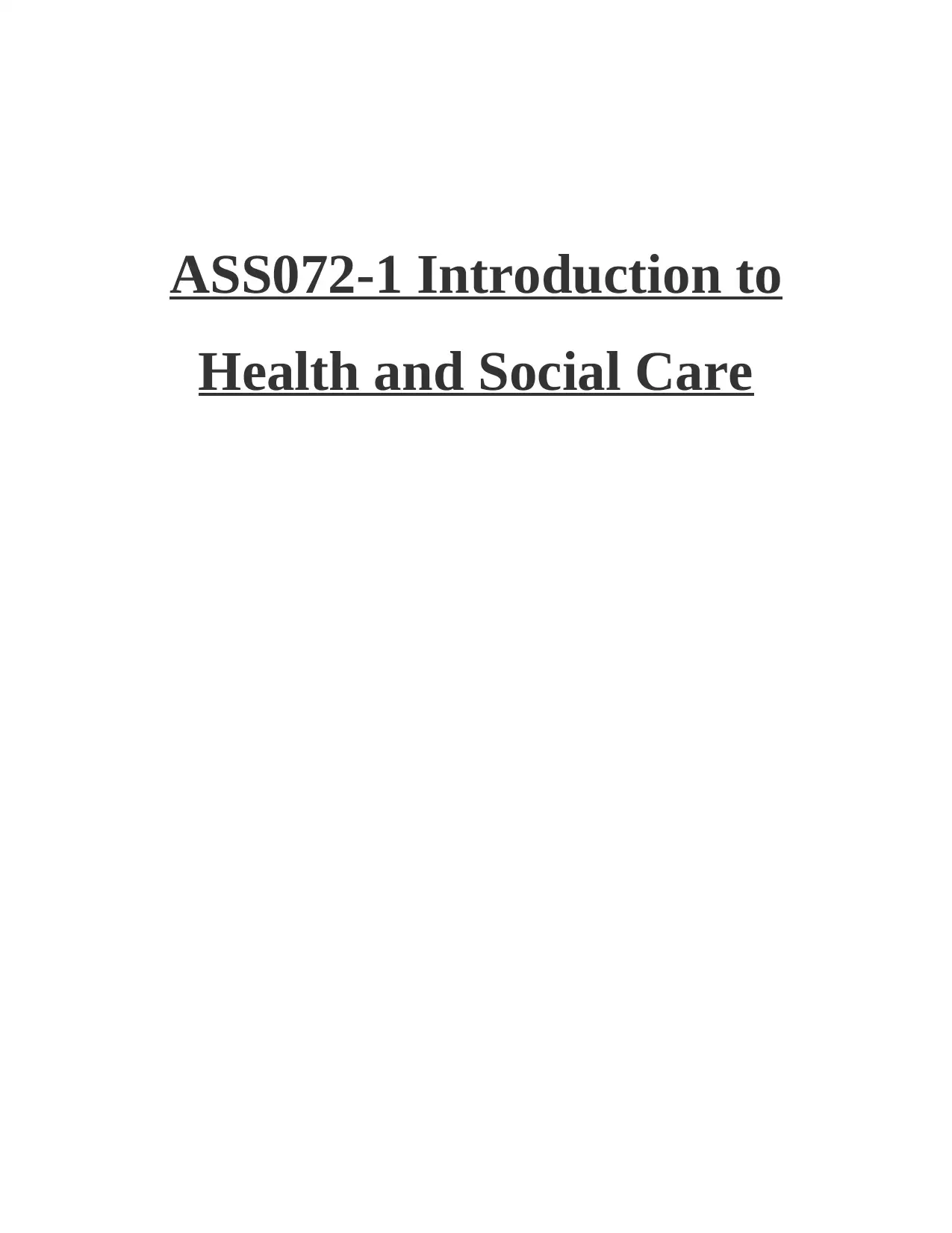
ASS072-1 Introduction to
Health and Social Care
Health and Social Care
Paraphrase This Document
Need a fresh take? Get an instant paraphrase of this document with our AI Paraphraser
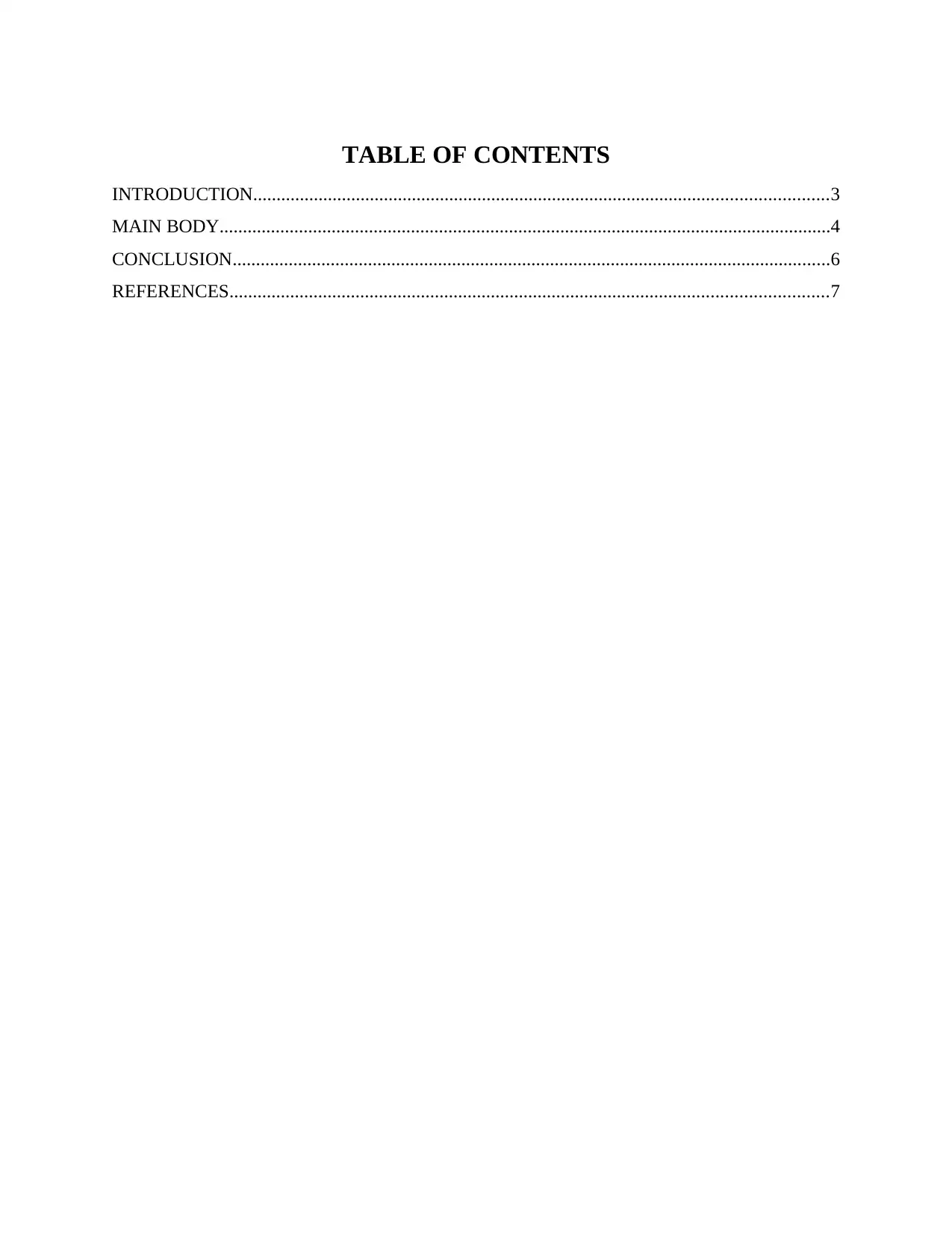
TABLE OF CONTENTS
INTRODUCTION...........................................................................................................................3
MAIN BODY...................................................................................................................................4
CONCLUSION................................................................................................................................6
REFERENCES................................................................................................................................7
INTRODUCTION...........................................................................................................................3
MAIN BODY...................................................................................................................................4
CONCLUSION................................................................................................................................6
REFERENCES................................................................................................................................7
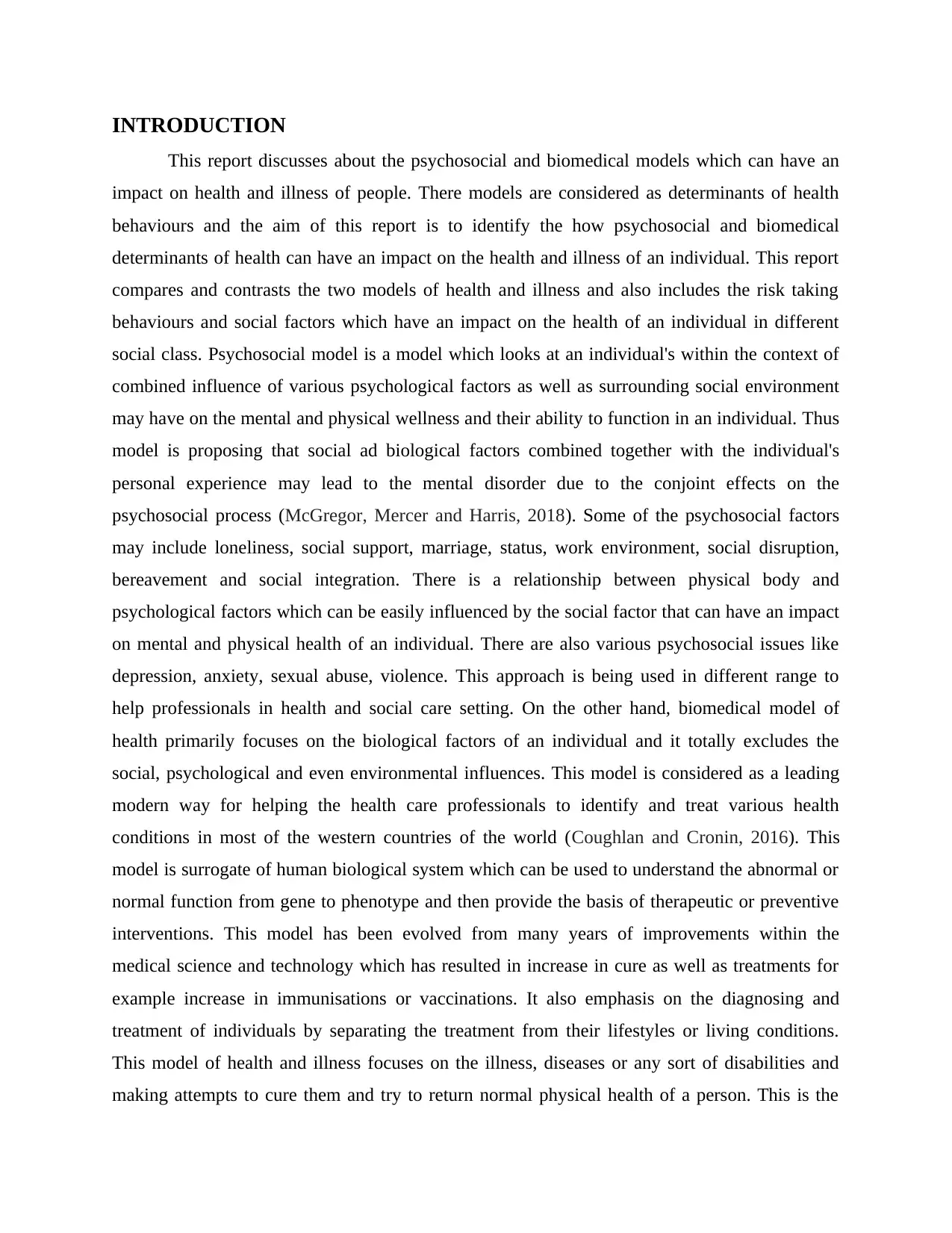
INTRODUCTION
This report discusses about the psychosocial and biomedical models which can have an
impact on health and illness of people. There models are considered as determinants of health
behaviours and the aim of this report is to identify the how psychosocial and biomedical
determinants of health can have an impact on the health and illness of an individual. This report
compares and contrasts the two models of health and illness and also includes the risk taking
behaviours and social factors which have an impact on the health of an individual in different
social class. Psychosocial model is a model which looks at an individual's within the context of
combined influence of various psychological factors as well as surrounding social environment
may have on the mental and physical wellness and their ability to function in an individual. Thus
model is proposing that social ad biological factors combined together with the individual's
personal experience may lead to the mental disorder due to the conjoint effects on the
psychosocial process (McGregor, Mercer and Harris, 2018). Some of the psychosocial factors
may include loneliness, social support, marriage, status, work environment, social disruption,
bereavement and social integration. There is a relationship between physical body and
psychological factors which can be easily influenced by the social factor that can have an impact
on mental and physical health of an individual. There are also various psychosocial issues like
depression, anxiety, sexual abuse, violence. This approach is being used in different range to
help professionals in health and social care setting. On the other hand, biomedical model of
health primarily focuses on the biological factors of an individual and it totally excludes the
social, psychological and even environmental influences. This model is considered as a leading
modern way for helping the health care professionals to identify and treat various health
conditions in most of the western countries of the world (Coughlan and Cronin, 2016). This
model is surrogate of human biological system which can be used to understand the abnormal or
normal function from gene to phenotype and then provide the basis of therapeutic or preventive
interventions. This model has been evolved from many years of improvements within the
medical science and technology which has resulted in increase in cure as well as treatments for
example increase in immunisations or vaccinations. It also emphasis on the diagnosing and
treatment of individuals by separating the treatment from their lifestyles or living conditions.
This model of health and illness focuses on the illness, diseases or any sort of disabilities and
making attempts to cure them and try to return normal physical health of a person. This is the
This report discusses about the psychosocial and biomedical models which can have an
impact on health and illness of people. There models are considered as determinants of health
behaviours and the aim of this report is to identify the how psychosocial and biomedical
determinants of health can have an impact on the health and illness of an individual. This report
compares and contrasts the two models of health and illness and also includes the risk taking
behaviours and social factors which have an impact on the health of an individual in different
social class. Psychosocial model is a model which looks at an individual's within the context of
combined influence of various psychological factors as well as surrounding social environment
may have on the mental and physical wellness and their ability to function in an individual. Thus
model is proposing that social ad biological factors combined together with the individual's
personal experience may lead to the mental disorder due to the conjoint effects on the
psychosocial process (McGregor, Mercer and Harris, 2018). Some of the psychosocial factors
may include loneliness, social support, marriage, status, work environment, social disruption,
bereavement and social integration. There is a relationship between physical body and
psychological factors which can be easily influenced by the social factor that can have an impact
on mental and physical health of an individual. There are also various psychosocial issues like
depression, anxiety, sexual abuse, violence. This approach is being used in different range to
help professionals in health and social care setting. On the other hand, biomedical model of
health primarily focuses on the biological factors of an individual and it totally excludes the
social, psychological and even environmental influences. This model is considered as a leading
modern way for helping the health care professionals to identify and treat various health
conditions in most of the western countries of the world (Coughlan and Cronin, 2016). This
model is surrogate of human biological system which can be used to understand the abnormal or
normal function from gene to phenotype and then provide the basis of therapeutic or preventive
interventions. This model has been evolved from many years of improvements within the
medical science and technology which has resulted in increase in cure as well as treatments for
example increase in immunisations or vaccinations. It also emphasis on the diagnosing and
treatment of individuals by separating the treatment from their lifestyles or living conditions.
This model of health and illness focuses on the illness, diseases or any sort of disabilities and
making attempts to cure them and try to return normal physical health of a person. This is the
⊘ This is a preview!⊘
Do you want full access?
Subscribe today to unlock all pages.

Trusted by 1+ million students worldwide
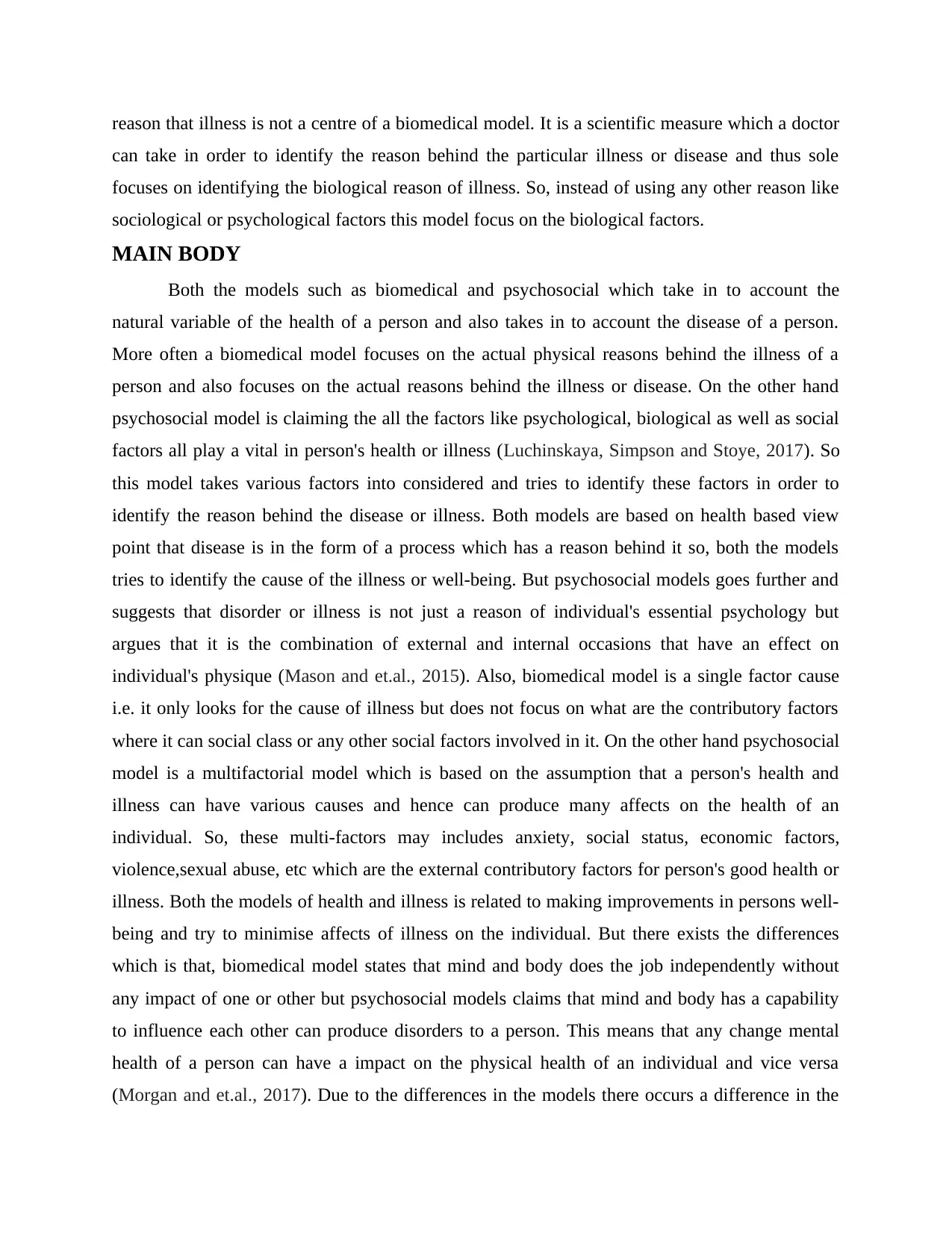
reason that illness is not a centre of a biomedical model. It is a scientific measure which a doctor
can take in order to identify the reason behind the particular illness or disease and thus sole
focuses on identifying the biological reason of illness. So, instead of using any other reason like
sociological or psychological factors this model focus on the biological factors.
MAIN BODY
Both the models such as biomedical and psychosocial which take in to account the
natural variable of the health of a person and also takes in to account the disease of a person.
More often a biomedical model focuses on the actual physical reasons behind the illness of a
person and also focuses on the actual reasons behind the illness or disease. On the other hand
psychosocial model is claiming the all the factors like psychological, biological as well as social
factors all play a vital in person's health or illness (Luchinskaya, Simpson and Stoye, 2017). So
this model takes various factors into considered and tries to identify these factors in order to
identify the reason behind the disease or illness. Both models are based on health based view
point that disease is in the form of a process which has a reason behind it so, both the models
tries to identify the cause of the illness or well-being. But psychosocial models goes further and
suggests that disorder or illness is not just a reason of individual's essential psychology but
argues that it is the combination of external and internal occasions that have an effect on
individual's physique (Mason and et.al., 2015). Also, biomedical model is a single factor cause
i.e. it only looks for the cause of illness but does not focus on what are the contributory factors
where it can social class or any other social factors involved in it. On the other hand psychosocial
model is a multifactorial model which is based on the assumption that a person's health and
illness can have various causes and hence can produce many affects on the health of an
individual. So, these multi-factors may includes anxiety, social status, economic factors,
violence,sexual abuse, etc which are the external contributory factors for person's good health or
illness. Both the models of health and illness is related to making improvements in persons well-
being and try to minimise affects of illness on the individual. But there exists the differences
which is that, biomedical model states that mind and body does the job independently without
any impact of one or other but psychosocial models claims that mind and body has a capability
to influence each other can produce disorders to a person. This means that any change mental
health of a person can have a impact on the physical health of an individual and vice versa
(Morgan and et.al., 2017). Due to the differences in the models there occurs a difference in the
can take in order to identify the reason behind the particular illness or disease and thus sole
focuses on identifying the biological reason of illness. So, instead of using any other reason like
sociological or psychological factors this model focus on the biological factors.
MAIN BODY
Both the models such as biomedical and psychosocial which take in to account the
natural variable of the health of a person and also takes in to account the disease of a person.
More often a biomedical model focuses on the actual physical reasons behind the illness of a
person and also focuses on the actual reasons behind the illness or disease. On the other hand
psychosocial model is claiming the all the factors like psychological, biological as well as social
factors all play a vital in person's health or illness (Luchinskaya, Simpson and Stoye, 2017). So
this model takes various factors into considered and tries to identify these factors in order to
identify the reason behind the disease or illness. Both models are based on health based view
point that disease is in the form of a process which has a reason behind it so, both the models
tries to identify the cause of the illness or well-being. But psychosocial models goes further and
suggests that disorder or illness is not just a reason of individual's essential psychology but
argues that it is the combination of external and internal occasions that have an effect on
individual's physique (Mason and et.al., 2015). Also, biomedical model is a single factor cause
i.e. it only looks for the cause of illness but does not focus on what are the contributory factors
where it can social class or any other social factors involved in it. On the other hand psychosocial
model is a multifactorial model which is based on the assumption that a person's health and
illness can have various causes and hence can produce many affects on the health of an
individual. So, these multi-factors may includes anxiety, social status, economic factors,
violence,sexual abuse, etc which are the external contributory factors for person's good health or
illness. Both the models of health and illness is related to making improvements in persons well-
being and try to minimise affects of illness on the individual. But there exists the differences
which is that, biomedical model states that mind and body does the job independently without
any impact of one or other but psychosocial models claims that mind and body has a capability
to influence each other can produce disorders to a person. This means that any change mental
health of a person can have a impact on the physical health of an individual and vice versa
(Morgan and et.al., 2017). Due to the differences in the models there occurs a difference in the
Paraphrase This Document
Need a fresh take? Get an instant paraphrase of this document with our AI Paraphraser
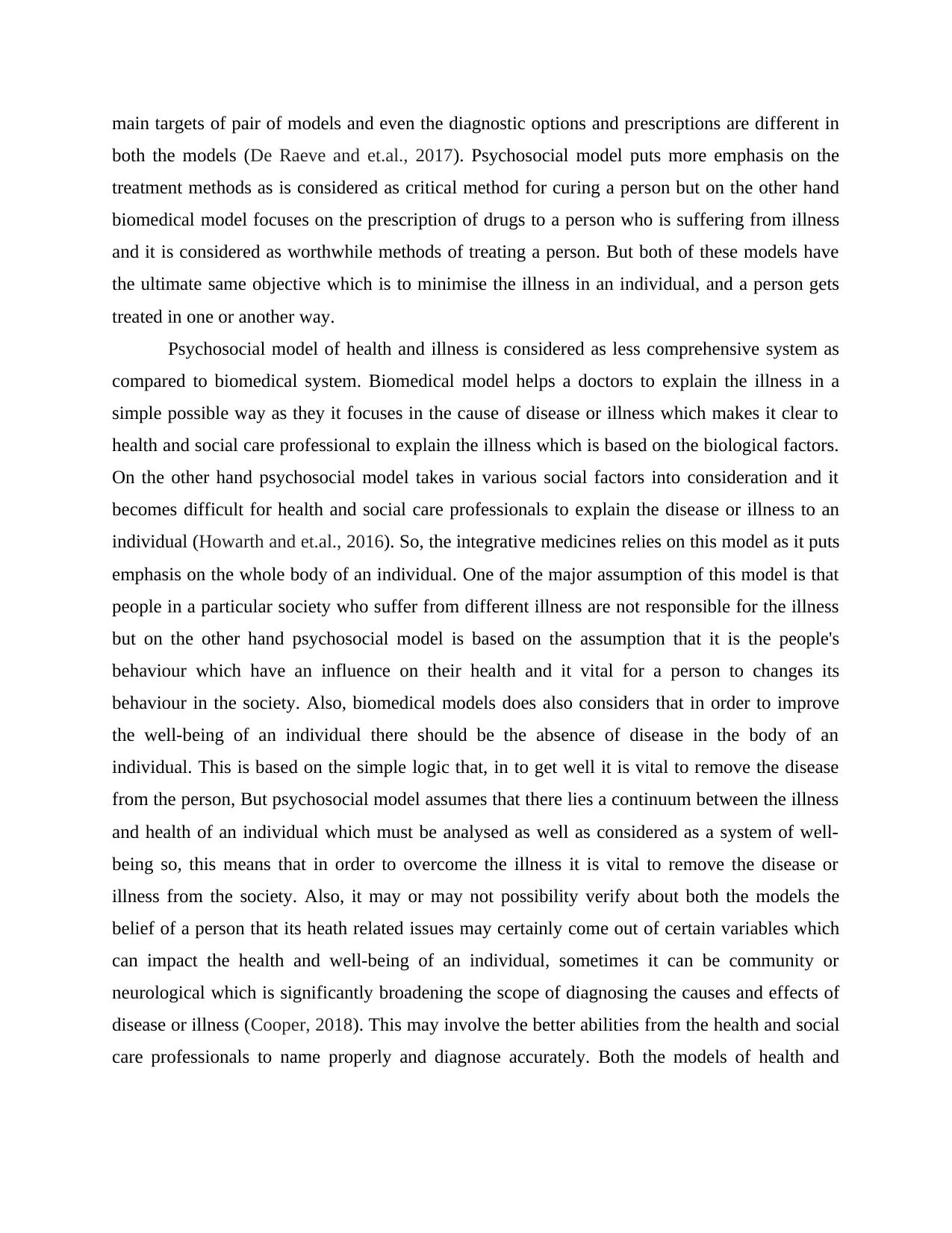
main targets of pair of models and even the diagnostic options and prescriptions are different in
both the models (De Raeve and et.al., 2017). Psychosocial model puts more emphasis on the
treatment methods as is considered as critical method for curing a person but on the other hand
biomedical model focuses on the prescription of drugs to a person who is suffering from illness
and it is considered as worthwhile methods of treating a person. But both of these models have
the ultimate same objective which is to minimise the illness in an individual, and a person gets
treated in one or another way.
Psychosocial model of health and illness is considered as less comprehensive system as
compared to biomedical system. Biomedical model helps a doctors to explain the illness in a
simple possible way as they it focuses in the cause of disease or illness which makes it clear to
health and social care professional to explain the illness which is based on the biological factors.
On the other hand psychosocial model takes in various social factors into consideration and it
becomes difficult for health and social care professionals to explain the disease or illness to an
individual (Howarth and et.al., 2016). So, the integrative medicines relies on this model as it puts
emphasis on the whole body of an individual. One of the major assumption of this model is that
people in a particular society who suffer from different illness are not responsible for the illness
but on the other hand psychosocial model is based on the assumption that it is the people's
behaviour which have an influence on their health and it vital for a person to changes its
behaviour in the society. Also, biomedical models does also considers that in order to improve
the well-being of an individual there should be the absence of disease in the body of an
individual. This is based on the simple logic that, in to get well it is vital to remove the disease
from the person, But psychosocial model assumes that there lies a continuum between the illness
and health of an individual which must be analysed as well as considered as a system of well-
being so, this means that in order to overcome the illness it is vital to remove the disease or
illness from the society. Also, it may or may not possibility verify about both the models the
belief of a person that its heath related issues may certainly come out of certain variables which
can impact the health and well-being of an individual, sometimes it can be community or
neurological which is significantly broadening the scope of diagnosing the causes and effects of
disease or illness (Cooper, 2018). This may involve the better abilities from the health and social
care professionals to name properly and diagnose accurately. Both the models of health and
both the models (De Raeve and et.al., 2017). Psychosocial model puts more emphasis on the
treatment methods as is considered as critical method for curing a person but on the other hand
biomedical model focuses on the prescription of drugs to a person who is suffering from illness
and it is considered as worthwhile methods of treating a person. But both of these models have
the ultimate same objective which is to minimise the illness in an individual, and a person gets
treated in one or another way.
Psychosocial model of health and illness is considered as less comprehensive system as
compared to biomedical system. Biomedical model helps a doctors to explain the illness in a
simple possible way as they it focuses in the cause of disease or illness which makes it clear to
health and social care professional to explain the illness which is based on the biological factors.
On the other hand psychosocial model takes in various social factors into consideration and it
becomes difficult for health and social care professionals to explain the disease or illness to an
individual (Howarth and et.al., 2016). So, the integrative medicines relies on this model as it puts
emphasis on the whole body of an individual. One of the major assumption of this model is that
people in a particular society who suffer from different illness are not responsible for the illness
but on the other hand psychosocial model is based on the assumption that it is the people's
behaviour which have an influence on their health and it vital for a person to changes its
behaviour in the society. Also, biomedical models does also considers that in order to improve
the well-being of an individual there should be the absence of disease in the body of an
individual. This is based on the simple logic that, in to get well it is vital to remove the disease
from the person, But psychosocial model assumes that there lies a continuum between the illness
and health of an individual which must be analysed as well as considered as a system of well-
being so, this means that in order to overcome the illness it is vital to remove the disease or
illness from the society. Also, it may or may not possibility verify about both the models the
belief of a person that its heath related issues may certainly come out of certain variables which
can impact the health and well-being of an individual, sometimes it can be community or
neurological which is significantly broadening the scope of diagnosing the causes and effects of
disease or illness (Cooper, 2018). This may involve the better abilities from the health and social
care professionals to name properly and diagnose accurately. Both the models of health and
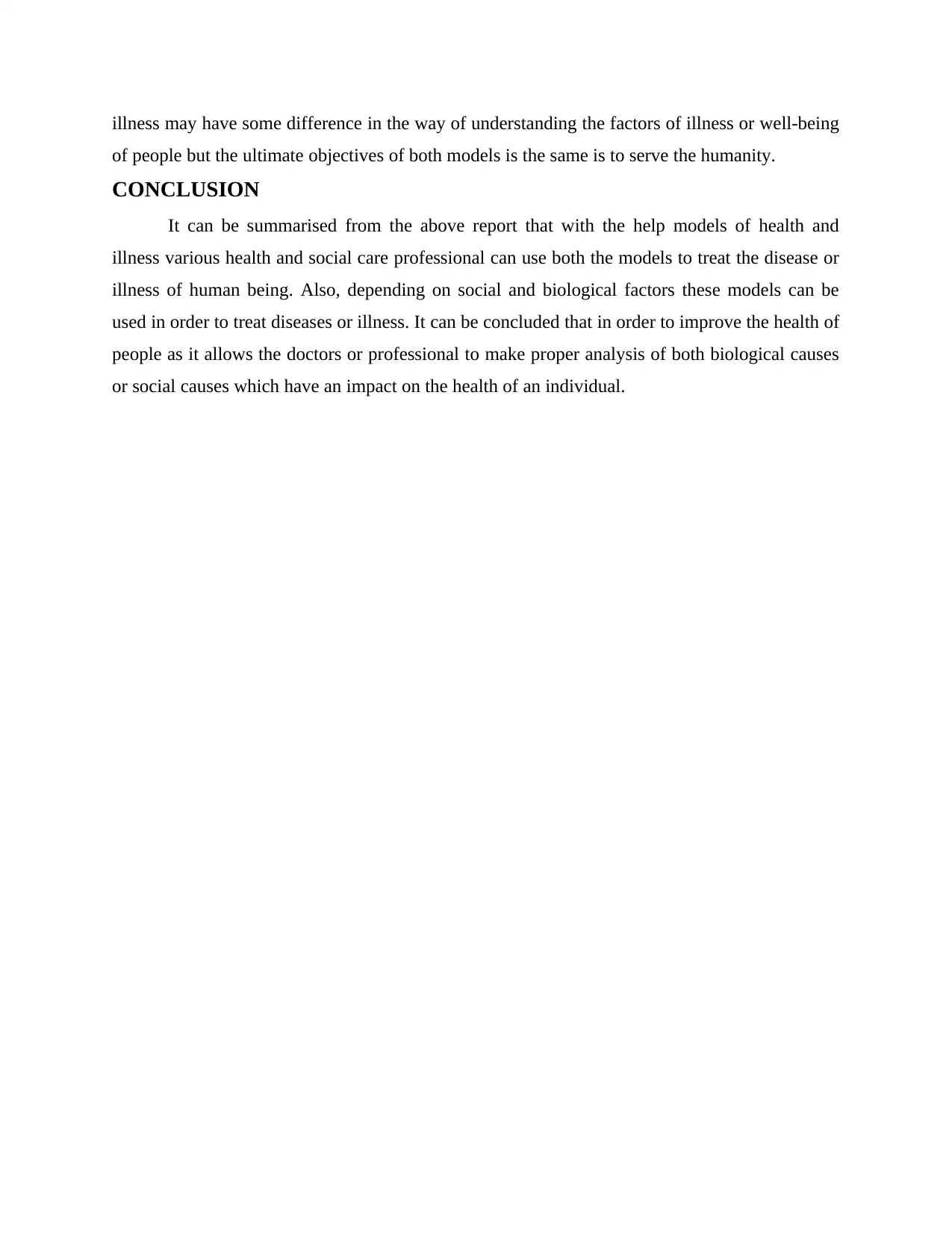
illness may have some difference in the way of understanding the factors of illness or well-being
of people but the ultimate objectives of both models is the same is to serve the humanity.
CONCLUSION
It can be summarised from the above report that with the help models of health and
illness various health and social care professional can use both the models to treat the disease or
illness of human being. Also, depending on social and biological factors these models can be
used in order to treat diseases or illness. It can be concluded that in order to improve the health of
people as it allows the doctors or professional to make proper analysis of both biological causes
or social causes which have an impact on the health of an individual.
of people but the ultimate objectives of both models is the same is to serve the humanity.
CONCLUSION
It can be summarised from the above report that with the help models of health and
illness various health and social care professional can use both the models to treat the disease or
illness of human being. Also, depending on social and biological factors these models can be
used in order to treat diseases or illness. It can be concluded that in order to improve the health of
people as it allows the doctors or professional to make proper analysis of both biological causes
or social causes which have an impact on the health of an individual.
⊘ This is a preview!⊘
Do you want full access?
Subscribe today to unlock all pages.

Trusted by 1+ million students worldwide
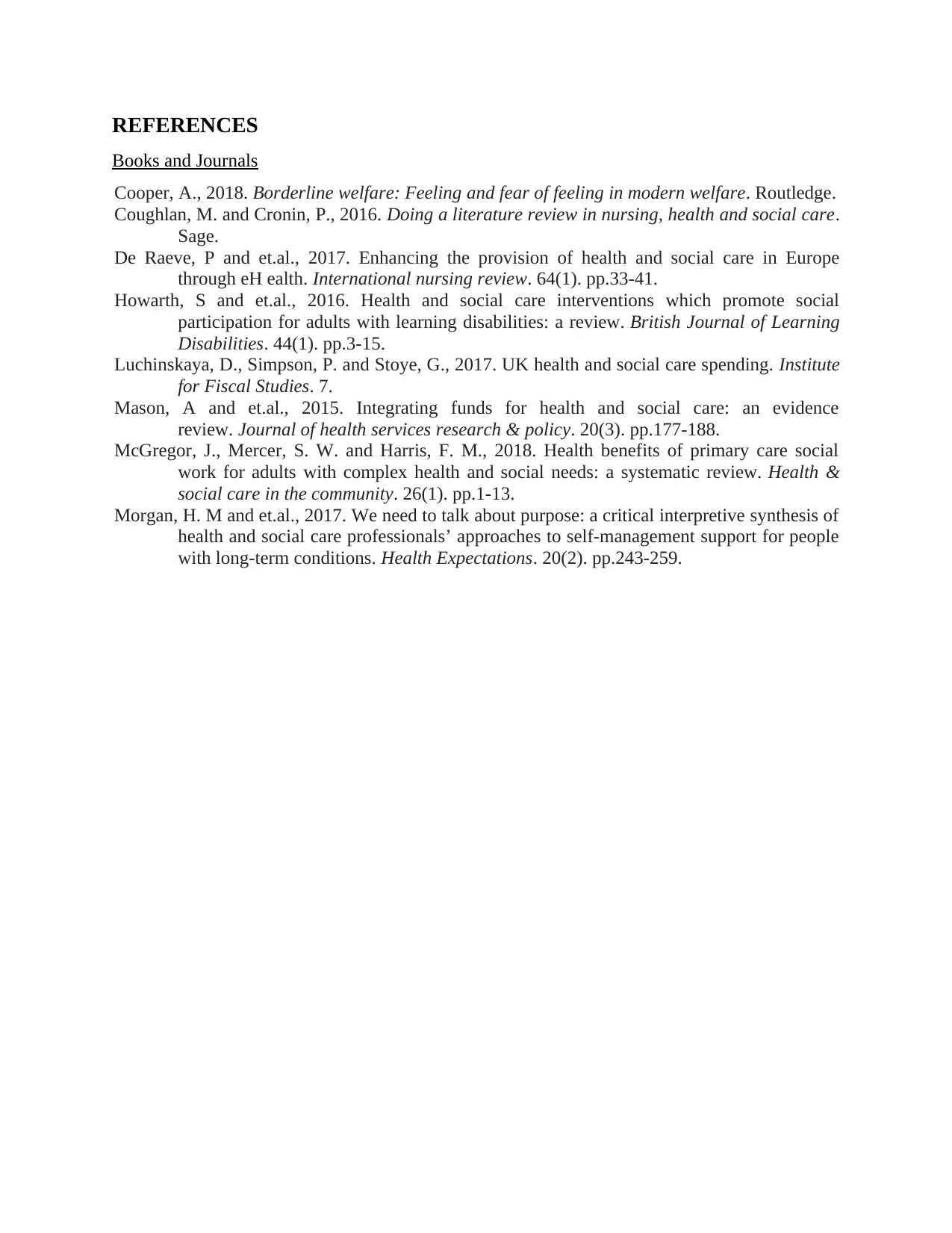
REFERENCES
Books and Journals
Cooper, A., 2018. Borderline welfare: Feeling and fear of feeling in modern welfare. Routledge.
Coughlan, M. and Cronin, P., 2016. Doing a literature review in nursing, health and social care.
Sage.
De Raeve, P and et.al., 2017. Enhancing the provision of health and social care in Europe
through eH ealth. International nursing review. 64(1). pp.33-41.
Howarth, S and et.al., 2016. Health and social care interventions which promote social
participation for adults with learning disabilities: a review. British Journal of Learning
Disabilities. 44(1). pp.3-15.
Luchinskaya, D., Simpson, P. and Stoye, G., 2017. UK health and social care spending. Institute
for Fiscal Studies. 7.
Mason, A and et.al., 2015. Integrating funds for health and social care: an evidence
review. Journal of health services research & policy. 20(3). pp.177-188.
McGregor, J., Mercer, S. W. and Harris, F. M., 2018. Health benefits of primary care social
work for adults with complex health and social needs: a systematic review. Health &
social care in the community. 26(1). pp.1-13.
Morgan, H. M and et.al., 2017. We need to talk about purpose: a critical interpretive synthesis of
health and social care professionals’ approaches to self‐management support for people
with long‐term conditions. Health Expectations. 20(2). pp.243-259.
Books and Journals
Cooper, A., 2018. Borderline welfare: Feeling and fear of feeling in modern welfare. Routledge.
Coughlan, M. and Cronin, P., 2016. Doing a literature review in nursing, health and social care.
Sage.
De Raeve, P and et.al., 2017. Enhancing the provision of health and social care in Europe
through eH ealth. International nursing review. 64(1). pp.33-41.
Howarth, S and et.al., 2016. Health and social care interventions which promote social
participation for adults with learning disabilities: a review. British Journal of Learning
Disabilities. 44(1). pp.3-15.
Luchinskaya, D., Simpson, P. and Stoye, G., 2017. UK health and social care spending. Institute
for Fiscal Studies. 7.
Mason, A and et.al., 2015. Integrating funds for health and social care: an evidence
review. Journal of health services research & policy. 20(3). pp.177-188.
McGregor, J., Mercer, S. W. and Harris, F. M., 2018. Health benefits of primary care social
work for adults with complex health and social needs: a systematic review. Health &
social care in the community. 26(1). pp.1-13.
Morgan, H. M and et.al., 2017. We need to talk about purpose: a critical interpretive synthesis of
health and social care professionals’ approaches to self‐management support for people
with long‐term conditions. Health Expectations. 20(2). pp.243-259.
1 out of 7
Related Documents
Your All-in-One AI-Powered Toolkit for Academic Success.
+13062052269
info@desklib.com
Available 24*7 on WhatsApp / Email
![[object Object]](/_next/static/media/star-bottom.7253800d.svg)
Unlock your academic potential
Copyright © 2020–2026 A2Z Services. All Rights Reserved. Developed and managed by ZUCOL.





